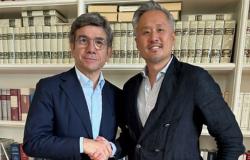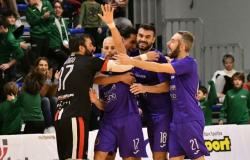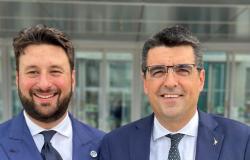In another article we report on the presentation of the book “At every step, at every beat. History of the pilgrim Nicholas” by Mons. Natale Albino, published by Edb (Edizioni Dehoniane Bologna).
In addition to the Author, the announced personalities were also present: HE Mons. Leonardo D’Ascenzo, Archbishop of Trani-Barletta-Bisceglie and Nazareth – HE Mons. Dionysios Papavasileiou, Auxiliary Bishop of His Eminence Polykarpos, Orthodox Metropolitan of Italy and Exarch of Southern Europe, based in Bologna – HE Mons. Flavio Pace, Secretary of the Dicastery of the Holy See for the Promotion of Christian Unity – HE Dr. Michele di Bari, Prefect of Naples, who moderated the presentation.
The Diocese of Trani sends us the reflection of our Pastor, Monsignor Leonardo D’Ascenzo.
***
The city of Trani, about a thousand years ago, welcomed the young Nicola from Stiri, Greece, recognizing him as a witness of the Gospel, a witness of the love of God. Today, we ask him together with our brothers of the Sacred Orthodox Archdiocese of Italy and Exarchate for Southern Europe, present here, to intercede for our Churches so that we know how to welcome God’s love and forgiveness to then share it with every brother and sister. We all hope, with greater strength after the inclusion of Saint Nicholas the Pilgrim among the Saints of Magna Graecia, that our friendship and the path towards full unity can continue and grow over time.
In the short biographical note on Saint Nicholas reported in Just masses of this Archdiocese, we find it written thus: “Born in Greece, after spending some years in solitude, he arrived in Puglia traveling through it with a cross in his hand, invoking God’s mercy with the invocation: Kyrie eleison. He stopped in Trani, where he died a few days after his arrival, in 1094, leaving a great reputation for sanctity. A few years after his death, Urban II canonized him, Byzantium, archbishop and people applauded “. A few notes that offer us the main, essential coordinates, the horizon within which we can insert this meeting and our own life, every step, every beat!
Saint Nicholas the Pilgrim with a cross in his hand and two words on his lips, Kyrie eleison, left us the example of how to live our history in the gift of self and in the announcement of love. How many people, individually or in groups, would need a good dose of humility and sincerity to deal with the evangelical essentiality of Saint Nicholas and overcome envy, jealousy, selfishness, closure, management of goods and money that are not respectful of the person and in contradiction with the teachings of the Lord Jesus. Fortunately there are many other people who, in this uncertain and difficult time of social, environmental, economic and health crisis, give an extraordinary testimony of serenity and joy that come from above and, also in their simplicity, economic poverty, lack of possibilities, of resources, they pray and live the Kyrie eleison.
In the history of the Church, towards the end of the time of the martyrs, a new form of life begins to make its way, the monastic experience, whose ideal is to realize in an entire existence what the martyr lived in a moment: the gift of one’s life in union with Jesus who died for the salvation of humanity. Monks are those who live in total resemblance to Christ.
The first expression of monastic life is the hermitic or anchorite one. It spread in the 4th century, when there were mass conversions and the tenor of Christian life weakened. Among the various forms of this particular/extreme form of life – the stantesthat is, stationary people who impose absolute immobility on themselves, the stylites on the column, i dendrites that live on trees or in them acemites those people who don’t sleep, i wooded who live like animals by grazing on grass, i inmates who allow themselves to be walled up in caves – there is that of the so-called dementedthose who pretend to be crazy to make others despise them because of Jesus.
I don’t know if Nicholas can be placed in the category of these first anchorite monks. Certainly he is a Christian who wishes to live in total resemblance to Jesus, throughout his life, announcing the Gospel with his own experience, with his own person.
He lives the gospel in a radical way, similar to the Master, Jesus, without discounts or accommodations. This makes it a living expression of the Christian paradox, humanly evaluated as madness.
Christianity, in fact, is a paradox precisely because it is founded on the person of the Son of God who became incarnate, a truth that to human logic appears absurd, contradictory: Jesus, how can he be God and man at the same time? This is the paradox, the madness: the Almighty in the Child Jesus becomes fragile, the Infinite becomes small; power is expressed in service; enemies are recipients of love and forgiveness; the last are first; death is life! So, what humanly, rationally, we are led to see as separate, in contrast, in Christianity becomes an encounter, composition and expression of a new reality.
And whoever welcomes and experiences all this, like Nicola, is a paradox, he is a madman!
Our saint is a person in love with Jesus who lived the Gospel in its totality, and felt the call to proclaim and bear witness to it in his world by shouting the Kyrie eleison.
The testimony of Adelferio di Trani is oriented in this direction:
«While the most blessed Nicholas dedicated himself to divine things and led groups of boys around the walls, the illustrious archbishop Byzantium, particularly well-versed in letters, moved by the voices of the people, inquired about what was happening. When he was told that it was a young man from Greece, he did nothing but shout the Kyrie eleison, gave orders to bring him immediately into his presence. As soon as the man of God was brought and found himself in the presence of the prelate, he was questioned by him about the reason for his behavior. To which he, with a serene face and mild words, gave this answer:
O lord, who is not ignorant of any of the evangelical precepts, you know well that Jesus Christ, our Lord, commanded that whoever would follow him should take up his cross and follow him. And you equally know that he told the disciples themselves that if they had not converted and become like children they would not have entered the kingdom of heaven. Reflecting on these things, I was not ashamed to carry the cross both internally and externally, nor to walk in the manner of thetochildren, nor did I try to avoid the ridicule of men. I leave it to your judgment as to whether or not it is appropriate to do so. In fact, if this doesn’t displease you, I intend to stay here with you, otherwise I will spontaneously leave the city.» (Gerardo Cioffari, Saint Nicholas the pilgrim patron of Trani and the Archdiocese. Life, criticism and spiritual messageEditrice Rotas Barletta 2014, 137-138).
How much need there is even today for this madness that announces, that cries out for mercy, that asks for mercy. Today, unfortunately, as in the past, unfortunate follies are imposed: the madness of war which sows only death, destruction, poverty, pain; the madness of indifference, of selfish individualism; the madness of those, in the Church and outside the Church, who are whitewashed tombs, hypocritical and false people who hide corruption and vice behind a beautiful appearance; the madness of life that is not welcomed after being conceived, or commodified together with motherhood, or accompanied towards euthanasia when marked by the fragility and suffering of the disease, or considered a category of waste when it does not correspond to the criteria of efficiency or youngness age; the madness of this time which is unable to accompany young people and support them in their difficulties which often become the cause of crises and choices of paths of death; the madness of people who have to flee their land of origin and instead of finding a better living situation end up in spirals of violence, closure and rejection, often with the dramatic epilogue of death.
Our Patron Saint helps us to grasp and welcome the heart of the Gospel, the commandment of love towards God and towards others, the paradox, the good madness of Kyrie eleison prayed, shouted and embodied.
The life of Saint Nicholas is, as we well know, characterized by his prayer. Known as prayer of the heart, it responds to the command repeated many times in the Bible to pray in every situation of life, always, continuously (in 1 Thess 5, 17 Saint Paul invites the community to pray without interruption; Rom 12, 12 invites us to be persevering in prayer; in Luke 18:1 Jesus himself tells a parable about the need to always pray without getting tired). Our elders have been faithful to all this with the practice of ejaculatory. They are those short prayers, as if launched towards the sky, repeated continuously throughout the day, even during household chores or when one is busy with various daily commitments, with the aim of keeping alive the awareness of being before God because God is before to us, always, he never abandons us, he takes care of us, he supports us, he loves us. The prayer of Kyrie eleison it is continuous prayer, prayer of the heart.
The origin of every reality that has existence is love, the love of God. Each of us is the recipient of this love that has given us life. A gift that continues to make us live. A merciful love that never abandons us, even when we decide to distance ourselves from Him through sin. Help us, Saint Nicholas the Pilgrim, to understand that first we need to live with the awareness that we are joyful and convinced debtors, serene and fearful of God, of life, of our brothers and sisters, especially the poorest, and for we are called to give what we are to them, to be truly generous and free and not just in appearance and then, only then, as Jesus says in the Gospel, can we be his true disciples, follow him and bear witness to him.
I wish the many who read Don Natale Albino’s volume to live the same experience that Cardinal Marcello Semeraro, Prefect of the Dicastery for the Causes of Saints describes in the preface: in delving deeper into the figure of Saint Nicholas “it happened that curiosity was initially followed by interest and then, after interest, by passion: such is the fascination that emerges from the story of this young pilgrim…”.
At every step of our earthly life, with every beat of our heart, curiosity, interest, passion and fascination for the young Nicholas the Pilgrim, help us to live, in the prayer of the heart and in the testimony of pilgrimage, the paradox and madness of the Kyrie eleison.
+ Monsignor Leonardo D’Ascenzo





